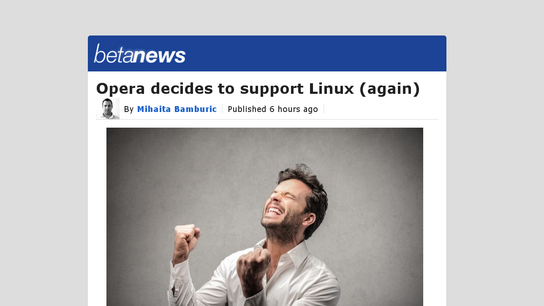I want to shed some light on why it took Opera almost one year to bring the Opera web browser back to the Linux desktop. The Opera web browser saw its initial return to the open-platform world of GNU/Linux today. Releasing Opera for Linux in the Opera developer stream with no commitment to release a stable version just yet. Meaning, there’s no guarantee of quality at the moment. That being said, it works pretty damned smooth.
Availability
The initial release officially only supports the Unity and GNOME desktop environments on Ubuntu 64-bit Linux distribution (well, meaning newer Debian-based distributions.) It is a stable system to target with a large user-base.
Other Linux distributions and more alternative systems such as FreeBSD should not hold their breath for official support just yet. Opera is going after the largest distribution and user-base first. However, within the restrictions of the license agreement (Opera isn’t open-source), Linux distributions are encouraged to repackage Opera for their users. Arch Linux already have an AUR package description from a member of that community.

What took you so long?
A little more than one year ago, Opera decided to move away from its own Presto engine and basically leave behind a decade of legacy code. Rewriting a new browser based on the Chromium/Blink engine was a huge undertaking. Although initially scheduled for release alongside Windows and Mac, the job of fully supporting a third and diverse operating system proved too much. Opera being intent on meeting a regular release schedule in a competitive market — priorities had to be made and focus was moved to the most popular operating systems.
The decision to leave Linux behind wasn’t popular among external nor internal users. However, it was necessary to ship a high-quality web browser. Linux could have been shipped earlier, but not at this quality level. Technologies we saw coming down the line — such as Aura — and the groundwork by the two other platforms paved the way for the Linux port we have today.
It should not be any surprise that today’s release comes due to great demand for a Linux version from the community. Like in any large development house, Opera Software houses many developers and other Linux enthusiasts. There’s more interest in the Linux platform now than ever before! We may even be approaching the fabled “year of the Linux desktop” with SteamOS and new large game titles being ported every week.
Contrary to popular beliefs, there were no issues related to maintaining the Linux kernel.
Positive response
The release also reached new users and news sites that usually don’t write about Opera. The lead image from the article Opera decides to support Linux (again) over at BetaNews nicely sums up the community feeling about the Linux release. A response echoed from many voices at Opera as well.
I am personally very pleased to see Opera once again on my preferred desktop.
PS: Opera for Linux’s User-Agent is the same as Opera for Android in Desktop mode’s:
Mozilla/5.0 (X11; Linux x86_64) AppleWebKit/version (KHTML, like Gecko) Chrome/chromium-version Safari/version OPR/opera-version (Edition Developer)

